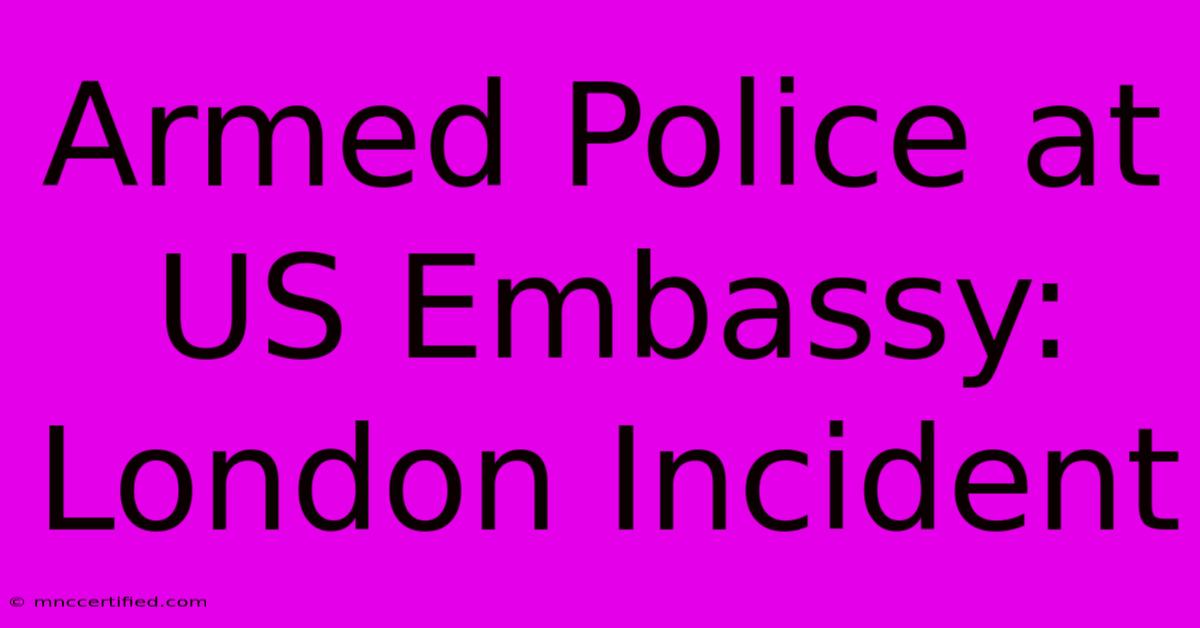Armed Police At US Embassy: London Incident

Table of Contents
Armed Police at US Embassy: London Incident - A Deep Dive into Security Concerns
The presence of armed police at the US Embassy in London is not uncommon, but any heightened security measures inevitably spark public interest and raise questions about potential threats. This article delves into the specifics of recent incidents, explores the reasons behind the increased police presence, and examines the broader context of embassy security in the UK.
Understanding the Context: Embassy Security in the UK
The US Embassy in London, located in Nine Elms, is a high-profile target. As a symbol of American power and influence, it's a potential focal point for protests, demonstrations, and, unfortunately, more serious threats. The Metropolitan Police Service (MPS) maintains a significant security presence around the embassy 24/7, a standard practice for protecting diplomatic missions. This includes both uniformed and plain-clothes officers, as well as sophisticated surveillance technology.
However, visible increases in armed police presence, such as those reported in the news, often signal a specific and heightened threat assessment. These assessments are based on a range of intelligence, including:
- Specific intelligence reports: Information from various intelligence agencies regarding potential attacks or planned disruptions.
- Global threat levels: Changes in the global security landscape, such as increased terrorist activity or geopolitical instability, can impact local threat levels.
- Local events: Major events in London, or even protests near the embassy, can necessitate a stronger police presence.
Recent Incidents and Public Response
While specific details of increased armed police presence at the US Embassy are often kept confidential for security reasons, news reports frequently highlight visible changes in security posture. These reports often generate public concern and speculation. It's crucial to rely on credible news sources and official statements from the MPS and the US Embassy to avoid misinformation.
Analyzing past incidents – even those not directly related to the embassy itself – can shed light on the reasons behind heightened security. For example, a terrorist attack elsewhere in the UK or a global increase in terrorist activity could trigger a precautionary increase in security around all diplomatic buildings.
The Importance of Accurate Reporting
It's critical to avoid spreading unsubstantiated rumors or speculation. When encountering news about increased security at the US Embassy, refer to official sources. Look for statements from:
- The Metropolitan Police Service (MPS): They are the primary responsible agency for policing in London.
- The US Embassy in London: The embassy itself may release statements addressing security concerns.
- Reputable news organizations: Stick to well-established news outlets known for their journalistic integrity.
The Role of Counter-Terrorism Policing
The MPS's Counter Terrorism Policing (CTP) unit plays a vital role in securing diplomatic missions like the US Embassy. CTP works closely with international partners and intelligence agencies to assess and mitigate threats. Their efforts include:
- Intelligence gathering: Collecting and analyzing information to identify potential threats.
- Operational planning: Developing strategies and tactics to respond to threats.
- Collaboration: Working with other agencies, both domestically and internationally.
Conclusion: A Necessary Precaution
The presence of armed police at the US Embassy in London is a necessary security measure. While it might cause public concern, it's crucial to understand the complex threat landscape and the crucial role of the MPS and other security agencies in protecting diplomatic missions and the public. Staying informed through official channels and reliable news sources is key to navigating the often-confusing information surrounding these security deployments. By understanding the context and relying on credible information, we can better appreciate the importance of these security measures and avoid contributing to the spread of misinformation.

Thank you for visiting our website wich cover about Armed Police At US Embassy: London Incident. We hope the information provided has been useful to you. Feel free to contact us if you have any questions or need further assistance. See you next time and dont miss to bookmark.
Featured Posts
-
Non Owner Car Insurance Oklahoma
Nov 22, 2024
-
Buyers Agent Investment Property
Nov 22, 2024
-
Strictlys Pete Love Triangle Confession
Nov 22, 2024
-
Pam Bondi 2020 Election False Claims
Nov 22, 2024
-
Summer Food Science Program Penn State
Nov 22, 2024